#regime change in venezuela
Explore tagged Tumblr posts
Text
By Andreína Chávez Alava
For over two decades, Venezuela has been the target of the “free elections” broken record alongside regime change operations and economic sanctions, leaving a long trail of destruction behind. How does the U.S. get away with this “free elections” scam? With the unconditional support of the remorseless corporate media.
#elections#Venezuela#imperialism#media#sanctions#Donald Trump#Genocide Joe#Hillary Clinton#propaganda#regime change#Bolivarian Revolution#Struggle La Lucha
38 notes
·
View notes
Text
Since I’m not seeing many posts about what’s happening in Venezuela, I will make one myself. Please do not turn a blind eye to their ongoing crisis.
First I will put you into context, please note that all this information is taken from posts, threads and statements made by Venezuelans so I will hyperlink each one of my sources.
From 2002 to 2013, Hugo Chávez was the president of Venezuela. Not only did he ruin the country’s economy, imprison people and remove liberty of speech in the country, but he also changed the constitution, allowing unlimited reelection. His regime became a dictatorship disguised as a democracy. Here’s an entire page about this period. (And you can read more searching ���chavismo”)
After his death in 2013, Nicolás Maduro took the presidency. Venezuelans started protesting and, as a response, they were repressed and killed, universities were burned down and Venezuela became massively poor, people lacked basic needs (supermarkets were empty, increasing famine and malnutrition), hospitals lacked resources and, consequently, illnesses spread and infant mortality rates increased severely.
This Sunday, July 28th, 2024, elections were held and Venezuelans voted for Edmundo González to be the next president of the country. Exit polls expected him to win the elections.
Later, the revealed results were that Maduro had won with the 51,2% votes, while Edmundo González had only 44,2%. But, as of right now, already 75% of the electoral records confirm that Edmundo González was, in fact, the chosen candidate, meaning that Maduro once again cheated on the elections. This is electoral fraud. This is not a democracy, this is a dictatorship.
Now, Venezuelans are protesting and the government are once again repressing them. Civilians are being persecuted, attacked and killed. Innocent people are being arrested. The government is cutting their communication and are planning on cutting the electricity next.
I urge you to check this thread on Twitter by @/postmortemria. Her account is full of information about Venezuela and their crisis, please check her posts and share them to spread the voice. Try to raise Venezuelans’ voices and donate to them if you can.
At the moment, there aren’t many ways to help other than speaking up, but under this tweet you can find many talented artists and commissions are their way to make some money to pay for basic human needs. If you can, think about commissioning a piece or donating to them.
In addition, here’s another tweet with information to donate to the people affected in the protests. They’re in desperate need of assistance so anything can help.
#venezuela#venezuela libre#eyes on venezuela#election fraud#i am NOT venezuelan. so once again i’d like to clarify that i am not trying to explain their history but to raise their voices.#all i’ve included here is taken from reliable sources or statements made by venezuelans#i’ve hyperlinked everything with the purpose of more people raising their voices and educating themselves.
2K notes
·
View notes
Text
[H]undreds of legal experts and groups on Monday urged the global community—and the United States government in particular—"to comply with international law by ending the use of broad, unilateral coercive measures that extensively harm civilian populations."
In a letter to U.S. President Joe Biden, the jurists and legal groups wrote that "75 years ago, in the aftermath of one of the most destructive conflicts in human history, nations of the world came together in Geneva, Switzerland to establish clear legal limits on the treatment of noncombatants in times of war."
"One key provision... is the prohibition of collective punishment, which is considered a war crime," the letter continues. "We consider the unilateral application of certain economic sanctions to constitute collective punishment."
Suzanne Adely, president of the National Lawyers Guild—one of the letter's signatories—said in a statement that "economic sanctions cause direct material harm not only to the people living on the receiving end of these policies, but to those who rely on trade and economic relations with sanctioned countries."
"The legal community needs to push back against the narrative that sanctions are nonviolent alternatives to warfare and hold the U.S. Government accountable for violating international law every time it wields these coercive measures," she added.[...]
"Hundreds of millions of people currently live under such broad U.S. economic sanctions in some form, including in notable cases such as Cuba, Iran, North Korea, Syria, and Venezuela," the letter notes. "The evidence that these measures can cause severe, widespread civilian harm, including death, is overwhelming. Broad economic sanctions can spark and prolong economic crises, hinder access to essential goods like food, fuel, and medicine, and increase poverty, hunger, disease, and even death rates, especially among children. Such conditions in turn often drive mass migration, as in the recent cases of Cuba and Venezuela."
For more than 64 years, the U.S. has imposed a crippling economic embargo on Cuba that had adversely affected all sectors of the socialist island's economy and severely limited Cubans' access to basic necessities including food, fuel, and medicines. The Cuban government claims the blockade cost the country's economy nearly $5 billion in just one 11-month period in 2022-23 alone. For the past 32 years, United Nations member states have voted overwhelmingly against the U.S. embargo on Cuba. Last year's vote was 187-2, with the U.S. and Israel as the only dissenters.
According to a 2019 report from the Center for Economic and Policy Research, a progressive think tank based in Washington, D.C., as many as 40,000 Venezuelans died from 2017-18 to U.S. sanctions, which have made it much more difficult for millions of people to obtain food, medicine, and other necessities.
"Civilian suffering is not merely an incidental cost of these policies, but often their very intent," the new letter asserts. "A 1960 State Department memo on the embargo of Cuba suggested 'denying money and supplies to Cuba, to decrease monetary and real wages, to bring about hunger, desperation, and overthrow of government.'"
"Asked whether the Trump administration's sanctions on Iran were working as intended, then-Secretary of State Mike Pompeo responded that 'things are much worse for the Iranian people, and we're convinced that will lead the Iranian people to rise up and change the behavior of the regime,'" the signers added.
12 Aug 24
339 notes
·
View notes
Note
Having seen what's currently happening in Venezuela, I feel so terrible for everyone to tried to vote Maduro out, and I worry about the US election. Will Trump and the GOP be able to do the same thing??
I agree that what's happening in Venezuela is bad and scary, but it's also not unexpected (unfortunately), and it doesn't correlate to the US election. It is very much a cautionary tale for us, but in the case of what could happen, not what has happened yet (and which we could and MUST still avoid). Here's why I think that.
First, Maduro is the heir of 25+ years of dictatorship (first the Chavez regime and then his), and that political machine has had a full generation to fix/control everything in Venezuela just as they want it. They've collapsed the economy, driven mass emigration/purges/brain drains, installed corrupt systems and destroyed civil society, staffed the government with cronies who will only ever do what Maduro personally says -- etc. In other words, exactly what Trump and the Republicans aspire to do here in America, but with 25 years' head start, so all those fixes are well entrenched. Outside observers were also warning well ahead of the Venezuelan vote that even an overwhelming majority for the opposition candidate might not be enough, because Maduro and co. can just fix the result however they want with imaginary fantasy numbers. (See Putin's "win" in the Russian presidential "election.") Because dictators all draw from the same playbook regardless of their professed ideological temperament, they always use the same tools.
Next, voting in Venezuela is all-electronic, which is obviously the easiest kind of voting to jigger, and which means that whatever the people actually select has little to no relevance to what gets published, recorded, or proclaimed. Now, despite the Republicans' constant screaming about ELECTION FRAUD, the 2020 elections in America were widely hailed as the safest, most accurate, and fraud-free in the nation's history. (For that matter, multiple investigations afterward have re-confirmed this, and the tiny handful of cases of election fraud that were found were committed by, you guessed it, Republicans.) This did not happen because of the Orange Fuhrer and co., who were busy trying to commit election fraud on their own behalves, but because America, however flawed, is still a participatory liberal democracy and citizens have the right to engage and to do so in a meaningful fashion. We had the entire investigation about how Russia meddled with the election in 2016, and changes were made. Cybersecurity experts were brought in; redundancies and failsafes were introduced; etc., and even the Russian campaign focused on psychological influence rather than actually, physically changing already-cast votes, because that is very, very hard to do in America. We are not an all e-voting nation; there are paper trails, hard-copy ballots, hand recounts, poll observers, election lawyers, and multiple other safeguards that exist. The Republicans have been attacking them as hard as they can, but they're still there.
Thirdly, the Evil Orange tried to fix the elections when he was the sitting president (don't forget the infamous "find me 11,780 votes" phone call to the Georgia Secretary of State that got him slapped with felony charges), but he couldn't do it even then. He also tried a coup as the sitting president, with full discretion as to whether, for example, the National Guard should be deployed to the Capitol on January 6, and that didn't succeed. As such, when he's a disgraced jobless felon who is not the commander-in-chief of the American military and holds no official or political role, he's definitely not getting it done now. There were reforms made to the Electoral Count Act to prevent another January 6, Biden and not Trump would be the president at any other attempted attack on the counting of electoral votes, and I can guarantee Biden would not sit around for three hours watching Fox News and cheering the rioters on if such a thing happened again. Trump has been threatening violence again because that's the only move in his playbook, and he wants to intimidate people into voting for him out of fear that he'll attack them if they don't give him what he wants, like any other psychopathic bully. But that does not mean he actually has the tools to successfully carry it off, and honestly, motherfucker? Try it one more fucking time. I double fucking dog dare you. Biden has 6 months left in his term and total immunity, according to your own SCOTUS. So.
Basically, Venezuela has already been a banana republic for 20+ years, the dictator has had a full generation to destroy it/remake it/turn it into his personal fiefdom, he allows elections only because he already knows they won't change anything or actually remove him from power, and that is precisely what Trump wants to do in the US -- but, and this is crucial, has not done yet. Which is why it is so, so important to Orange-Proof America and get rid of him once and for fucking all on November 5th. We can do it. So yes.
126 notes
·
View notes
Text
With Ukraine’s counteroffensive stalled and the U.S. Congress deadlocked over crucial military aid, some analysts have begun raising the specter of a turning point in the war that could lead to a Ukrainian defeat. While the situation on the ground is still far from dire, it could rapidly deteriorate in the absence of a significant infusion of U.S. military support for Ukraine.
The consequences of a Ukrainian defeat need to be fully understood. The likely geopolitical consequences are easy to anticipate. The defeat of a Western-backed country would embolden Russia and other revisionist states to change other borders by force. A Russian victory would frighten Russia’s European neighbors, possibly leading to a collapse of European collective security as some countries choose appeasement and others massively rearm. China, too, would conclude that Taiwan cannot rely on sustained U.S. support. Indeed, the ripple effects of U.S. indecision have already begun: In a move that recalls Russia’s illegal annexation of several regions of Ukraine, Venezuela this month claimed more than half of neighboring Guyana as its own. While there are no signs of an impending invasion, it would be naïve to think that other countries aren’t watching closely to see whether Russia’s land grab succeeds.
Many analysts have already described these far-reaching security risks. But they pale in comparison to the dire consequences for Ukraine and its inhabitants if Russia wins. It is important for both supporters and opponents of Ukraine aid to know what these consequences would be.
To understand Ukraine’s likely fate if Russia turns the tide, the best place to start is what the Russians actually say. On Dec. 8, Russian President Vladimir Putin made clear that in his view there is no future for the Ukrainian state. On Dec. 5, he spelled out his intention to “reeducate” the Ukrainian people, curing them of “Russophobia” and “historical falsifications.” On Nov. 12, former Russian Prime Minister Dmitry Medvedev made Russia’s appetites clear: “Odessa, Nikolaev, Kyiv, and practically everything else is not Ukraine at all.” It is “obvious,” he posted on Telegram, that Ukrainian President Volodymyr Zelensky is a “usurper,” that the Ukrainian language is only a “mongrel dialect” of Russian, and that Ukraine is “NOT a country, but artificially collected territories.” Other regime propagandists assert that the Ukrainian state is a disease that must be treated and Ukrainians a society that must be “de-wormed.”
More explicitly, Russia’s highly censored state television has, over the past two years, consistently promoted the rape of Ukrainians, the drowning of children, the leveling of cities, the eradication of the Ukrainian elite, and the physical extermination of millions of Ukrainians. For an excellent snapshot of these and other statements, Russian Media Monitor has compiled a must-watch collection of short clips from Russian television, complete with English subtitles. This coordinated campaign is not bluster but a harbinger of what awaits the Ukrainian people. In these remarks, we can see the contours of the atrocities awaiting Ukrainians under a total or nearly total Russian occupation.
We can also project the effect of a Russian victory from the atrocities that are already widespread in the Russian-occupied territories. According to official Ukrainian sources, nearly 2 million Ukrainians have already been removed from their homes and communities in the occupied areas and resettled in Russia, either temporarily or permanently. Other estimates range from 1.6 million to 4.7 million. Russian children’s commissioner Maria Lvova-Belova said that more than 700,000 Ukrainian children have been taken from Ukraine to Russia since February 2022; nearly 20,000 of these are known to Ukrainian authorities by name. Transferring children from their home country and denying them access to their language and culture is not only an internationally recognized war crime. Such forced assimilation is also defined by the U.N. Convention on Genocide as a genocidal act. It is why the International Criminal Court has issued a warrant for Lvova-Belova’s arrest.
Russia is not only ridding its occupied regions of Ukrainians but also replacing them with Russian settlers—a tragic continuity with Soviet and Russian imperial practices of systemic deportation, colonization, and Russification. In the Ukrainian city of Mariupol, where the Russian advance killed tens of thousands of civilians and destroyed 50 percent of the city’s housing stock, a handful of new apartment buildings were recently constructed. Some of that housing is being offered for sale, with Russians carpetbaggers snatching up real estate at bargain prices.
Ukraine’s partly occupied south offers a clear picture of the techniques used by the occupying forces to establish authority. A Human Rights Watch report from July 2022 documents a pattern of torture, disappearances, and arbitrary detention in the region. Citizens endured torture during interrogation, including beatings, electroshocks, and sensory deprivation. Several prisoners died from the torture, and large numbers have simply disappeared. Among the victims were local officials, teachers, representatives of the Orthodox Church of Ukraine, NGO activists, and members of Ukraine’s territorial defense. There also is a massive amount of information collected by human rights monitors and journalists about the operation of filtration and detention camps.
Political indoctrination and the militarization of youth are already key characteristics of life under Russian occupation. Political banners and posters promoting Russian patriotism are omnipresent in the occupied regions. New children’s textbooks expunge Ukrainian history and preach hatred for Ukraine’s leadership. The Ukrainian language is being removed from much of the education system and relegated to its colonial status as a quaint dialect representing nothing but a gradually disappearing regional culture soon to be subsumed in the Russified mainstream.
Already, millions of Ukrainians have had their lives destroyed in one way or another by Russia’s monstrous occupation. Were Russia to complete its conquest, it would be a multiple of that number. After almost a decade of war against Russia, Ukrainians are united and highly mobilized in the defense of their country’s borders, democracy, culture, and language, to which many Ukrainian Russian-speakers have switched out of disgust with Moscow’s invasion. Millions of Ukrainians have been enraged and radicalized by Russia’s war crimes and destruction of their towns and homes. Millions of Ukrainians have volunteered to assist the war effort, millions have contributed funds to support the military, and even more have turned to social media to vent and publicly register their rage at Putin and the Russian state.
That would not only make any conquest brutal and bloody. Should Ukraine lose, almost all of Ukrainian society would need to be punished, repressed, silenced, or reeducated if the occupation is to quell resistance and absorb the country into Russia. For this reason, a Russian takeover would be accompanied by mass arrests, long-term detentions, mass deportations into the Russian heartland, filtration camps on a vast scale, and political terror. If a serious insurgency emerges, the level of repression will only widen and deepen.
A major effort will also be required to rid the country of seditious materials, which is to say all films, novels, poetry, essays, art, scholarly works, and music that may contain positive references to Ukraine’s period of independence. Libraries and schools will be purged of all such subversive content—in essence, the majority of all writing and cultural output that Ukraine has produced during the last three decades. Writers and scholars will face the choice of repudiating their identity and past work or becoming nonpersons in the new order. Many will face arrest or worse, simply because they transport Ukrainian culture and stand in the way of Russification. Again, this is not speculation but widespread practice in other territories that Russia has occupied.
Russian territorial advances would be accompanied by a second wave of Ukrainian refugees far more massive than that of early 2022, when some 7 million Ukrainians crossed the border into the European Union. For the remaining Ukrainians, the future would be one of totalitarian controls on culture, education, and speech, accompanied by a mass terror on a scale not seen in Europe since the 20th-century era of totalitarian rule.
There you have in distilled form what a Russian victory would mean. Members of the U.S. Congress are free to vote against assistance to Ukraine if they think—wrongly—that the war’s outcome does not affect the U.S. national interest. But they should not be allowed to oppose assistance to Ukraine without being fully aware of the tyranny they will be helping to empower—and their responsibility for the massive and entirely predictable crimes that will ensue.
124 notes
·
View notes
Text

Today is election day in Venezuela, a day of hope for the people of this besieged South American nation, besieged by tyrannical, despotic and nepotistic socialist regime that has pushed at least 5 million people out of the country, set back the economy decades, and completely destroyed the social fabric of this once prosperous country.
If the democratic process is allowed to be successful, and the voices of those who remain in Venezuela be heard, today will be the end of the current regime, and the start of a new era of change for the better, let us all hope and pray this comes to pass, that Maduro for once takes a good decision in his disaster of a presidency and steps down once the democratic transition is confirmed.
¡Fuera Maduro! ¡Que viva Venezuela! 🇻🇪🇻🇪🇻🇪🇻🇪🇻🇪🇻🇪🇻🇪
41 notes
·
View notes
Text
La Violencia (Research I did for Encanto fic writers so you don't have to)
TW: Assassination and death
Long but necessary post
@yellowcry @miracles-and-butterflies @evostar (if you already knew about it, that's fine, but reblog so others can too.)
To put it simply;
During this time, an estimated 200,000 people lost their lives, with 112,000 of those deaths occurring between 1948 and 1950. Additionally, two million people were forcibly displaced from their homes, primarily to Venezuela.
The root of this conflict lies in the intense partisan rivalries between Colombia’s two traditional political parties: the Liberal Party and the Conservative Party. These tensions created a divide between liberals and conservatives, eventually leading to the partial collapse of the state and existing institutional structures. As violence escalated, economic motivations began to outweigh political ones, and armed bands took advantage of the chaos to commit robberies, assaults, and revenge against their neighbors.
More in depth;
La Violencia was a ten-year civil war in Colombia from 1948 to 1958, between the Colombian Conservative Party and the Colombian Liberal Party, fought mainly in the countryside.
Liberal hegemony continued through the 1930s and the World War II era, and Alfonso López Pumarejo was reelected in 1942; however, wartime conditions were not favourable to social change. In the elections of 1946, two Liberal candidates, Gabriel Turbay and Jorge Eliécer Gaitán, stood for election and thus split the Liberal vote. A Conservative, Mariano Ospina Pérez, took office.
Conservatives had been embittered by political sidelining and, since 1930, had suffered violent attacks at the hands of Liberal supporters. With the electoral victory of 1946 they instituted a series of crude reprisals against Liberals. It was the initiation of the period that was dubbed La Violencia. On April 9, 1948, Gaitán, leader of the left wing of the Liberal Party, was assassinated in broad daylight in downtown Bogotá. The resulting riot and property damage (estimated at $570 million throughout the country) came to be called the bogotazo.
La Violencia originated in an intense political feud between Liberals and Conservatives and had little to do with class conflict, foreign ideologies, or other matters outside Colombia. Authoritative sources estimate that more than 200,000 persons lost their lives in the period between 1946 and 1964.
The most spectacular aspect of the violence, however, was the extreme cruelty perpetrated on the victims, which has been a topic of continuing study for Colombians. La Violencia intensified under the regime of Laureano Gómez (1950–53), who attempted to introduce a fascist state. His excesses brought his downfall by military coup—Colombia’s first in the 20th century. Gen. Gustavo Rojas Pinilla assumed the presidency in 1953 and, aided by his daughter, María Eugenia Rojas, began an effort to end La Violencia and to stimulate the economy.
Rojas was a populist leader who supported citizens’ demands for the redress of grievances against the elite. Support for Rojas began to collapse when it appeared that he would not be able to fulfill his promises, when he showed reluctance to give up power, and when the economy faltered as a result of a disastrous fall in coffee prices in 1957. He was driven from office that year by a military junta.
The arrangement for the National Front government—a coalition of Conservatives and Liberals—was made by Alberto Lleras Camargo, representing the Liberals, and Laureano Gómez, leader of the Conservative Party, in the Declaration of Sitges (1957).
The unique agreement provided for alternation of Conservatives and Liberals in the presidency, an equal sharing of ministerial and other government posts, and equal representation on all executive and legislative bodies. The agreement was to remain in force for 16 years—equivalent to four presidential terms, two each for Conservatives and Liberals. The question of what governmental structure would follow the National Front was left unsettled.
It had been contemplated that a Conservative would be the first to occupy the presidency in 1958. When the Conservative Party could not agree on a candidate, however, the National Front selected Lleras, who had previously served in that office for 12 months in 1945–46.
During Lleras’s tenure an agrarian reform law was brought into effect, national economic planning for development began, and Colombia became the showcase of the Alliance for Progress (a U.S. attempt to further economic development in Latin America). But severe economic difficulties caused by low coffee prices, domestic unemployment, and the apparent end of the effectiveness of import substitution were only partially offset by Alliance aid.
The Alliance increased Colombia’s economic dependence on the United States, which, to some Colombians, had serious disadvantages. By 1962 economic growth had come almost to a standstill.
The precarious state of the economy and the degree of social tension were revealed when only about half of those eligible to vote did so in the 1962 presidential elections, which brought Guillermo León Valencia, a Conservative, to the presidency.
During Valencia’s first year in office internal political pressures led to devaluation of the peso (Colombia’s currency), wage increases among unionized workers of some 40 percent, and the most rampant inflation since 1905. Extreme deflationary policies were applied in the next three years, raising the unemployment rates above 10 percent in the major cities and turning even more Colombians against the National Front.
Less than 40 percent of the electorate went to the polls in the 1964 congressional elections.
Marxist guerrilla groups began appearing in Colombia during Valencia’s presidency. The first was the National Liberation Army (Ejército de Liberación Nacional; ELN), which was created by a group of Colombian students who had studied in Cuba.
Founded in 1964, the ELN followed strategies espoused by Che Guevara. Another guerrilla group, which followed two years later, was the Colombian Revolutionary Armed Forces (Fuerzas Armadas Revolucionarias de Colombia; FARC), which was more connected to Soviet-influenced communist movements. Much of FARC originated in the “resistance committees” that had appeared in Colombia during La Violencia.
Carlos Lleras Restrepo was the third National Front president (1966–70). He returned the economy to a sound footing, improved government planning for economic development, and pushed through political reforms essential to an orderly end to the Front (which seemed increasingly to constitute a monopoly of power by the Conservative-Liberal oligarchy).
Although the constitutional reform of 1968 stipulated that elections would become competitive again after 1974, the president was still required to give “adequate and equitable” representation to the second largest political party in his cabinet and in the filling of other bureaucratic posts.
Read more here (This article is mostly where I got my info from as well as copilot.ai. I know, AI is bad, but please don't judge me. I was not about to do six hours of research when I have a tool that can help me in seconds.)
What does this have to do with the madrigals?
Well, if you're planning on writing any madrigal (or all) outside of Encanto, La violencia is something you need to take into consideration. It's an important part of Colombia's culture and shouldn't be ignored.
(I just learned about it recently and in turn, need to rewrite some stuff. So I can only imagine that half of the Encanto fandom knows nothing about it)
What cities were safe you ask? I don't think there really was any.
Bogotá: As the capital of Colombia, Bogotá witnessed significant unrest during this period. Political factions clashed, leading to violence and instability.
Cali: Cali, located in the southwestern part of the country, also suffered from La Violencia. It was a hotspot for clashes between Liberal and Conservative supporters.
Medellín: Medellín, another major city, faced its share of violence. The conflict often played out in the streets, affecting civilians and communities.
Barranquilla: This coastal city experienced tensions between rival political groups, resulting in bloodshed and loss of life.
Cartagena: Cartagena, known for its historical significance, was not immune to the violence. The struggle between Liberals and Conservatives left scars on its urban landscape.
Cúcuta: Located near the border with Venezuela, Cúcuta also witnessed violence during La Violencia.
Palmira, Santa Marta, Soledad Atlántico, Armenia, Pereira, Neiva, Valledupar, Bucaramanga, Popayán, Villavicencio, and Soacha were other cities affected by the turmoil.
So, in either city, the madrigals would be exposed to this war if they chose to come out. Now, let's say Encanto is in the very center of Colombia (or at lease close to it) -

(Right where the red dot is)
The closest area is Villavicencio, Puerto Lypez, and Bogota. All three cities that were affected by the war. And I'm not saying Villavicencio is THAT close to Encanto, probably a week trip at best, but still.
Why did I choose the center of Colombia?
Because I don't see it sitting anywhere else. And it's convenient fic wise. But you can do what you want.
Now I'm not saying the Madrigals won't experience fun in the new world. They most certainly will (culture and technology wise), but the war is really unavoidable for them.
That's all for now, but if you have anything to add or for me to correct, reblog or message me.
#Encanto#encanto fanfic#mirabel madrigal#luisa madrigal#isabela madrigal#julieta madrigal#agustin madrigal#alma madrigal#bruno madrigal#antonio madrigal#camilo madrigal#dolores madrigal#pepa madrigal#felix madrigal
51 notes
·
View notes
Text


[Title] PANAMA DECLARATION ON POPULAR SOVEREIGNTY AND THE PRESIDENT-ELECT OF VENEZUELA, EDMUNDO GONZÁLEZ URRUTIA The former heads of State and Government who formed the Democratic Initiative of Spain and the Americas (IDEA Group), Given that we are approaching the bicentennial year of the Amphictyonic Congress convened by Simón Bolívar, on the Isthmus of Panama; Bearing in mind that on July 28th 2024, after the presidential elections in Venezuela have been held, as shown by the authentic voting records kept by the democratic opposition and verified by international technical institutions, Edmundo González Urrutia is the president-elect of Venezuela; Being expected for the president-elect to assume his presidential mandate for the constitutional six-year term that begins on January 10 2025, for which he would have the support of former presidents; Considering that the Venezuelan people, in a decisive manner and in an unprecedented majority, have decided on a change of political course and their desire to grow in freedom, following the sovereign mandate that has been dictated and that all the powers of the State are obliged to obey, especially the National Armed Forces, and that the international community of democracies must support it; We salute all Venezuelans, civilians or in uniform, and invite them to honor their national tricolor, to respect without reservation the Constitution and the sacred popular sovereignty that resides in them and from which all the organs of the State emanate; and, to this end, disavow, as ordered by the Constitution, any regime, law or authority that contradicts democratic values, principles and guarantees or undermines human rights. January 8, 2025
8 notes
·
View notes
Text
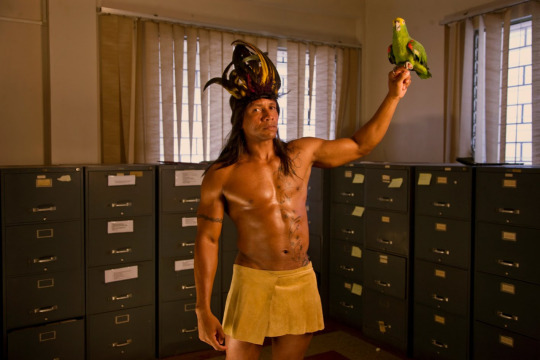
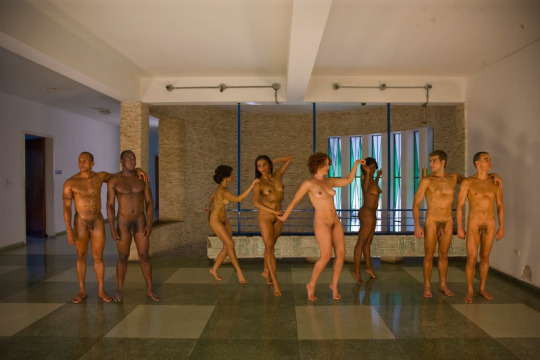
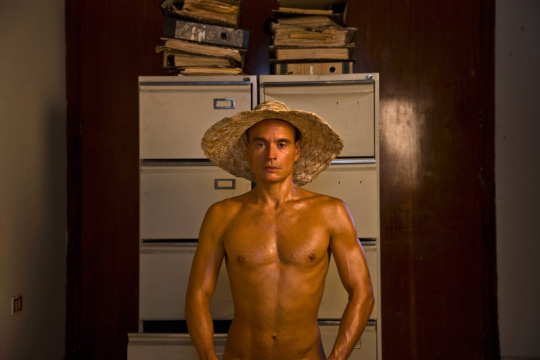
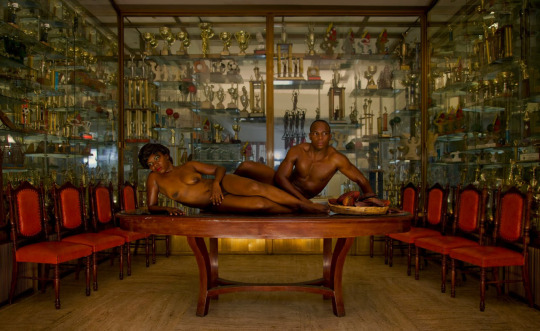
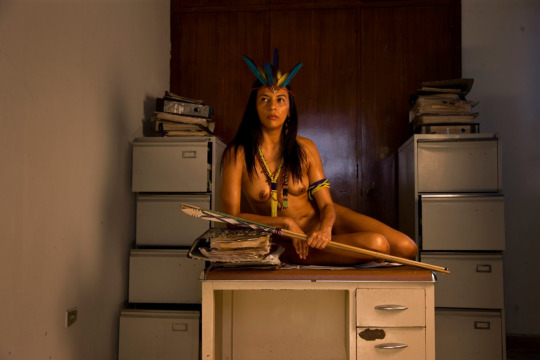
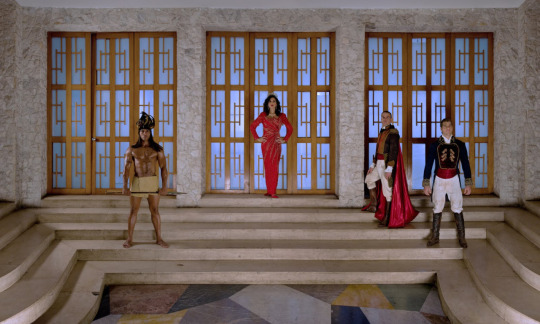
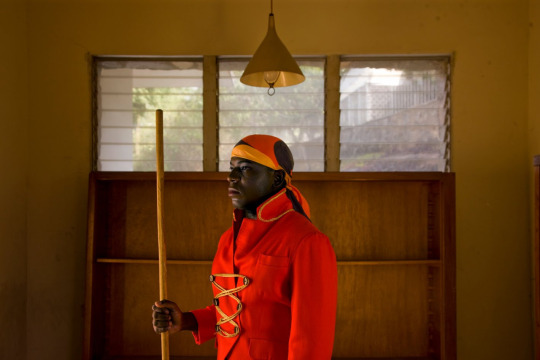
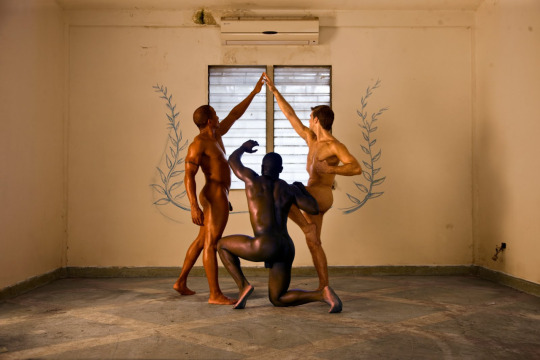
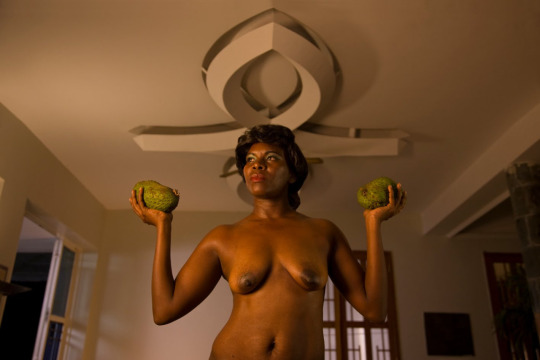
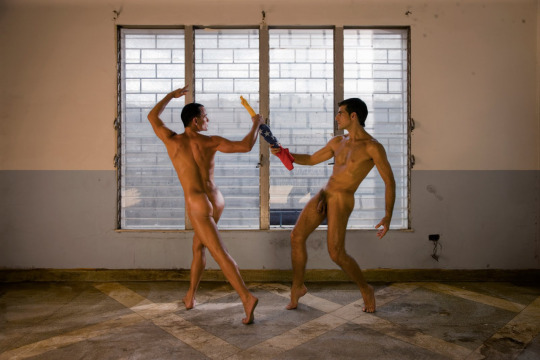
Ensayando la Postura Nacional by Alexander Apóstol
Based on the paintings of Pedro Centeno Vallenilla
Caracas experienced a strong urban construction growth after the death of the dictator Juan Vicente Gómez in 1936 until the 70´s. Important political changes: European and Latin-American migrations, and especially petroleum costs variations made Venezuelan mentality change at a speeding race to new perspectives that were demonstrated in different areas, architecture being the main element of change towards a modern city. Besides the big social differences, from then on, the Venezuelans have conceived to an extreme this modern period of time as the dream of a better future. In that time, important plastic artist irrupted during the 40´s, 50´s and 60´s; Escuela de caracas (landscaping), Los Disidentes (abstraction), and the Techo de La Ballena (informalism) were some of the most important avant-garde movements. Curiously enough, the Venezuelan artist Pedro Centeno Vallenilla, formed under the fascist Italian regime and exhibitor of a peculiar nationalist theme with a characterized mannerist and exaggerated aesthetic, worked independently from the avant-garde movements, he was even considered as a minor artist by them. Due to Vallenilla´s profound political views at the time, he was able to establish himself as the official painter during the dictatorship of Marcos Pérez Jiménez in the 50´s, where buildings like the National Capitol, the National Military or collections and private homes were decorated with his Works. Nowadays his works are still hung in these official buildings, where the nation’s history and the autochthonous elements together with the exaggerated and idealized aesthetic of the body and race, are the main characters in his work. What interests me is how his fertile visual language feeds the creation myths of the birth of the nation and establishes it like a part of the Venezuelan culture, in the political, social, military and even economic grounds of the country; where his work exemplifies, maybe fortunately, the prejudice, contradictions and acceptations on how Venezuelans want to see ourselves and how we wanted to be seen (and still want to be), contrasting with the exacerbated and vulnerable narcissism that fundaments itself on the starting resentments that we drag on form the colonial times. Finally I would like to focus Centeno Vallenilla´s work, independently from his pictorial quality, like the heir of a confused Venezuelan modernity in conception and ideology, confronted in the same way with the confused and complex political and social times that we are now living. Where the frontier between liberal ideologies and economic pragmatism associated with the conservatives, are faded together with the political ways of the country. In the film and photos, works of Centeno Vallenilla dedicated to the nation’s history, race and traditions, are converted into a tableaux vivant by people that come from the marginated areas of Caracas, but that are situated in the natural context of this artist, these spaces are modern but at the same time unused buildings, like a mansion turned into an office building; Nevertheless, these models try again and again, without achieving the goal, of recreating work by work The forced postures of the personalities represented in Vallenilla´s Works, demonstrating that there is a possibility that the idiosyncrasy of Venezuela comes from the eternal intent, with form but without meaning, of imagining improvised utopias that result in mere rehearsals of the country.
#art#paintings#photography#venezuela#pedro centeno vallenilla#venezuelan#alexander apóstol#venezuelan art
93 notes
·
View notes
Text
Trump Scapegoats Migrants While Backing Policies That Displace Them
youtube
Ben Becker, the Editor-in-Chief of BreakThrough News discusses how Trump and Harris fueled the anti-immigrant, anti-worker hysteria that propelled the politics of the US-Mexico into front and center of the 2024 election. Becker demystifies Trump’s many false, ahistorical claims about immigration policy, particularly how US regime change, sanctions, and interventions have fueled migration surges. Becker explains, “The biggest migratory surges of the last 10 years– whether it be from Syria, Afghanistan, Venezuela or Cuba” bear the “direct imprint of US foreign policy, intervention, sanctions, & blockades making lives miserable for people.”
8 notes
·
View notes
Text

Biden’s final days: Escalating aggression against Venezuela
By Lallan Schoenstein
After imposing genocidal policies that cost his party the U.S. election, President Joe Biden is filling out his final days of office with a slash-and-burn agenda that is even worse than the one he instigated before the elections.
In an outrageous attack on a sovereign country, the U.S. government is attempting to deny the Venezuelan people the leadership of their freely elected president, Nicolás Maduro. The Biden administration declared its belated recognition of Edmundo Gonzalez, the U.S.-funded candidate and big-time loser, in the July elections four months ago.
Biden waited until after the U.S. elections on Nov. 5 to more fully exercise his powers of “regime change” — a bid to overthrow a democratic election in Venezuela. Gonzalez is an old hand, a mercenary for the U.S. During the 1980s Contra war in Central America, Gonzales, operating from then-President C. A. Pérez’s Venezuelan embassy in El Salvador, was instrumental in running the covert U.S. counter-revolutionary campaign responsible for murdering thousands of Salvadorans.
#Venezuela#imperialism#antiwar#Nicolas Maduro#Genocide Joe#Joe Biden#Edmundo Gonzalez#contras#Latin America#Struggle La Lucha
13 notes
·
View notes
Text
During the 1930s business in Germany, including both Anglo-Iranian and Shell, was increasingly dominated by Nazi ideology. In places this was embraced. The Shell company Rhenania-Ossag adopted anti-Semitic policies, with Jewish members of the board being forced to resign two and half years before this was demanded by the Nuremberg Laws. This would have required the consent of the Shell Group board, upon which sat Sir Andrew Agnew. These changes took place not only at the level of senior executives but all the way through the company at drilling rigs, oil terminals, refineries, distribution depots and petrol stations. The nature of the Nazi regime was well understood by Shell and Anglo-Iranian both in Germany and outside it. This was a time when concentration camps, such as Dachau and Buchenwald, were operational and the rule of the Gestapo absolute. However, as long as trade could flow in and out of Germany the companies continued operating. Shell imported crude from, for example, its fields in Venezuela and refined it in Hamburg, while BP refined crude in Abadan in Iran, and shipped it into the German market.
James Marriott and Terry Macalister, Crude Britannia: How Oil Shaped a Nation
50 notes
·
View notes
Text
I've been meaning to say multiple things for a while.
To leave stuff clear just in case because I've seen some "particular" people lurking in the Hetalia fandom from time to time.
I like Ivan as a fictional character and that only, I don't support the real life Russia nor any country participating on genocide nor dictatorships, i am from Venezuela myself and I've suffered under a totalitarian regime I've just been able to escape last year, my family, friends, neighbors, and all lower class people like me have suffered a lot because of the dictatorship and corruption in general, and guess who supports Maduro's fucking dictatorship(The Russian government of course, who else), so I can assure you, that I HATE THEM, not only for what has happened at my home country but also because of what they're doing right now on Ukraine and what they've done in the past.
I joined the fandom three years ago, and ever since I've grown as a person and I've sought to educate myself on multiple matters, this has made me realise the Hetalia fandom, for some odd reason, tends to "attract" certain individuals... Not as much as the countryhumans fandom, God bless.
But we should never forget terrible incidents like, the aph Germany n*zi cosplayers, so similar situation aren't allowed to happen again.
To finish, I repeat.
I don't want a single irl Russia's (I repeat, the real life country) side on the war supporter and/or Zionist interacting with my posts or me at all.
I've been inactive for a while on multiple of my platforms, so I've been unable to curate who interacts with my posts on a daily basis or even who I might have interacted with in the past, falling victim to my own ignorance about the other person, which I'm trying to change for the better.
But a helping hand is always nice, so if anyone has knowledge of users like this who are active on the fandom, please let me know, because I don't want to have anything to do with them nor want them spreading their horrible message on the internet, so it is important we're vocal about these problems.
To every Russia/Israel supporter, Go fuck yourself.
18 notes
·
View notes
Text
Brazil's Lula Is Finally Turning on Venezuela

The regime of Venezuelan President Nicolás Maduro has few allies in Latin America—or the world—as crucial as Brazil. Under Workers’ Party (PT) Presidents Luiz Inácio Lula da Silva and Dilma Rousseff—and their longtime foreign-policy strategist Celso Amorim—Brazil has consistently backed Venezuela’s left-wing Bolivarian governments, from former President Hugo Chávez to Maduro. Even before Lula’s presidency, Brazil stood by Venezuela. In 2002, under the centrist President Fernando Henrique Cardoso, Brazil swiftly condemned the coup attempt against Chávez, standing in direct opposition to the U.S. stance.
Since then—with the exception of the years of former Brazilian President Jair Bolsonaro, when relations soured—both nations have forged strong ties through energy cooperation, trade, and environmental efforts, particularly in their shared responsibility for the Amazon rainforest. This cooperation was vital for preserving biodiversity, fighting organized crime, and resisting external pressures, making Venezuela a key ally for Brazil on multiple fronts. For the increasingly isolated Bolivarian regime, Brazilian support was an essential lifeline.
The regime of Venezuelan President Nicolás Maduro has few allies in Latin America—or the world—as crucial as Brazil. Under Workers’ Party (PT) Presidents Luiz Inácio Lula da Silva and Dilma Rousseff—and their longtime foreign-policy strategist Celso Amorim—Brazil has consistently backed Venezuela’s left-wing Bolivarian governments, from former President Hugo Chávez to Maduro. Even before Lula’s presidency, Brazil stood by Venezuela. In 2002, under the centrist President Fernando Henrique Cardoso, Brazil swiftly condemned the coup attempt against Chávez, standing in direct opposition to the U.S. stance.
Since then—with the exception of the years of former Brazilian President Jair Bolsonaro, when relations soured—both nations have forged strong ties through energy cooperation, trade, and environmental efforts, particularly in their shared responsibility for the Amazon rainforest. This cooperation was vital for preserving biodiversity, fighting organized crime, and resisting external pressures, making Venezuela a key ally for Brazil on multiple fronts. For the increasingly isolated Bolivarian regime, Brazilian support was an essential lifeline.
In recent months, however, a subtle but clear shift in Brazil’s stance has been taking shape. This change gained momentum after Venezuela’s recent elections, which Maduro claims to have won despite them being widely condemned by international observers as flawed and illegitimate.
In a departure from his historically unwavering support—and contrary to the PT’s official position—Lula has refrained from accepting Maduro’s victory. Two weeks after the vote, Lula labeled Maduro’s government as a “very unpleasant regime” with an “authoritarian slant,” stopping just shy of calling Venezuela a dictatorship.
Continue reading.
#brazil#brazilian politics#politics#venezuela#venezuelan politics#venezuelan elections#luiz inacio lula da silva#democracy#foreign policy#international politics#image description in alt#mod nise da silveira
5 notes
·
View notes
Text
Nearly one month ago, on July 28, Venezuela’s authoritarian president, Nicolás Maduro, stole an election. After a campaign period in which opposition presidential candidate Edmundo González consistently led polls, authorities quickly announced on election day that Maduro had won the race. They have yet to make official precinct-level results available for audit, as is required by Venezuelan law.
In response, the opposition gathered more than 23,000 vote tally sheets, representing nearly 80 percent of the country, and published the results online. In Venezuela, these tally sheets are normally made available to poll watchers. The opposition mobilized across Venezuela to ensure that they gathered evidence of the results, in some cases standing up to security forces and government supporters to do so.
Its planning paid off. The results gathered at polling locations indicate that González won more than twice as many votes as Maduro, rather than the narrow 51 percent victory that Maduro claimed. Independent exit surveys and media analyses support the opposition’s conclusion, and the evidence is so overwhelming that the United States and at least a dozen U.S. allies have issued statements recognizing González as the winner. On Aug. 22, however, Venezuela’s Supreme Court—stacked with Maduro loyalists—declared him the victor.
Although the election is over and Maduro remains in power, he looks weaker than at any point in recent years. He is leaning heavily on police and security forces to carry out a targeted repression campaign, which so far has resulted in more than 2,400 detentions and 24 deaths, according to Venezuelan human rights group PROVEA. Maduro is also taking his repression to the airwaves, shutting down Venezuelans’ access to X and encrypted messaging site Signal. These do not appear to be the actions of a strongman who feels safe and secure in his position.
The United States now has a crucial opportunity to push for a democratic opening in Venezuela. The Biden administration can do this by identifying key figures inside the government who may support a transition and applying pressure on them, while continuing to seek credible negotiations between figures in Maduro’s coalition and the opposition.
González and fellow opposition leader María Corina Machado appear to be working toward such a strategy. Their goal is to negotiate a peaceful transfer of power in exchange for certain guarantees or a potential amnesty for Maduro and his henchmen. They recognize that this is no easy task: “There are groups who are clearly willing to negotiate and press for that to occur, and others who are not,” Machado told reporters recently.
So far, the White House is keeping its cards close. In response to Venezuela’s stolen election, the administration has focused on carrots rather than sticks. The Wall Street Journal reported that Washington was offering to lift indictments on Maduro and other key ruling party figures if they enter talks to guide a transition. The United States is so far reticent to impose new sanctions on Venezuelan oil.
That may change if Maduro’s repression campaign continues with no sign of a transition. The White House should be taking stock of the available options to effectively press for a transition. Some in Washington are already demanding drastic action: A recently proposed bipartisan resolution co-sponsored by 30 members of the House of Representatives calls on the United States to “employ all available diplomatic and economic means to pressure the Maduro regime.”
The United States has a track record of offering sanctions relief for concessions from Maduro. Last October, the White House temporarily lifted some oil sanctions, and Maduro signed an agreement with the opposition to hold competitive elections. Although the United States partially snapped back these sanctions once it became clear that Machado would not be able to run, that deal ultimately facilitated last month’s election—which clearly demonstrated Venezuelans’ overwhelming rejection of Maduro and desire for change. It also allowed for the release of Venezuelan fugitive Alex Saab from U.S. prison in exchange for the freedom of all wrongfully detained Americans in Venezuela.
The United States continues to hold significant leverage over Venezuela. While it has provided licenses to U.S. and Western oil companies to continue operating in the country, Washington has kept a broader sanctions framework in place that limits the Venezuelan oil sector and its financial connectivity with the global economy. These licenses permit a Western footprint in the country—home to the planet’s largest oil reserves—while reducing the ease with which Maduro can divert oil proceeds through corruption.
For the Biden administration, the challenge will be to strike a balance between targeted and effective pressure on Venezuela’s elites, who back Maduro, while preventing Venezuela’s drift further into Russia and China’s orbit. Some policymakers in Washington worry that a return to the “maximum pressure” sanctions strategy of 2019 would push Maduro closer to U.S. geopolitical rivals that have recognized him as the election winner.
Individual sanctions on military, political, and economic elites may be a more attractive option than broader economic sanctions, but even they have clear limits. Punitive measures on key figures can create a rally-around-the-flag effect that often bolsters a regime’s cohesion. More than 160 individuals in the Maduro government have already been sanctioned by the United States, but many of them have been honored in public ceremonies in Venezuela rather than flipping on Maduro.
Carefully and strategically mapping out pressure points inside the regime may provide an effective path toward facilitating a democratic transition. The United States should identify and engage those most likely to support democratic reform from the inside. This means empowering moderate elements and isolating hard-liners to maximize the odds of successful transition talks.
Identifying these pressure points may be less difficult than it sounds. Although the size of Venezuela’s economy is still a fraction of what it was in the oil bonanza golden years, the opposition-led Venezuelan Finance Observatory suggests that GDP has grown quarterly by an average of 5 percent since early 2022, and other independent analysts report inflation has dropped to its lowest point in over a decade.
This growth has not been felt evenly across the country, but there is a set of economic, political, and military elites that—to put it crudely—has a good thing going and doesn’t want Maduro to derail it. Maduro is desperately working to convince these elites that he can reconnect the country with the global economy, but the fact that his post-election repression has once again put Venezuela on the path to greater isolation does not work in his favor.
Some power brokers in Maduro’s coalition may wonder if this chaos is what they signed up for, which may present the biggest loyalty test that the leader has faced in years. Many elites are weary of the prospect of Maduro assuming another illegitimate term, especially if it means six more years of repression, sanctions, and economic catastrophe. The White House has an opening to liaise with such figures, making sure that ruling party elites and the military understand the potential benefits of a democratic transition. Sanctions on individuals, if they are used, should include prudent communication of the conditions necessary for those penalties to be lifted.
Every action taken by the United States and its allies should be carefully weighed against the possibility that these actions can increase rather than decrease regime cohesion in Caracas. Here, the Biden administration can examine the Trump administration’s approach to Maduro’s regime.
After the push to recognize Juan Guaidó as interim president failed to dislodge Maduro in 2019, U.S. Special Representative for Venezuela Elliott Abrams and envoy Richard Grenell engaged in behind-the-scenes conversations with key power brokers in Maduro’s coalition. The Trump State Department’s 2020 Democratic Transition Framework for Venezuela, which outlined a path for power sharing and democratic coexistence in exchange for gradually lifting sanctions, offers a potential model of how to restore democracy.
If the Biden administration chooses to build on this framework, it will require more complicated negotiations than those that led to the July election. U.S. efforts should align with the priorities of González’s campaign, given his electoral victory. Any such deal must also tackle complex issues such as institutional reforms, transitional justice, the release of political prisoners, and the terms under which both the opposition and ruling party can coexist.
The United States should also continue coordinating its response to Venezuela’s crisis with partners in Latin America, particularly Brazil and Colombia. In recent weeks, these countries have been working behind the scenes to advance an agreement that would clear the way for a democratic outcome in Venezuela. They have floated different proposals, ranging from new elections to some form of power-sharing arrangement. So far, Brazil’s and Colombia’s proposals have been rejected by both the opposition and the government, illustrating the importance of local buy-in.
Although both countries are clear that they will not legitimize Maduro’s power grab, they have given no signs that they will cut diplomatic relations with Venezuela, much less join in an international sanctions campaign. But the fact that two leftist leaders who once expressed support for Maduro’s political mentor Hugo Chávez are united in rejecting his stolen election is a major step forward.
Venezuela’s turmoil has regional implications. Nearly 8 million Venezuelans are displaced, according to the United Nations. The longer the crisis drags on, the more migrants and refugees will flee to other countries, impacting domestic politics. There is no guarantee that regional efforts to encourage a democratic opening in the country will succeed. But the fact that regional leftist leaders are using their channels with Caracas to call for change is an opportunity for all, from the Venezuelan people to the White House.
The coming weeks and months will determine the success or failure of efforts to advance a peaceful and democratic solution in Venezuela. By leveraging their influence to shape incentives among Venezuelan elites, the United States and its allies in South America have an opportunity to support the Venezuelan people in their quest for democracy and stability.
17 notes
·
View notes
Text

I don't like getting political on main, mostly because of personal issues and anxieties, and maybe it is hypocresy on my end to speak on something just because it personally affects me, but here we go I guess.
Hi, I'm Sal, I'm an inmigrant from Venezuela, I have not returned to my country for 4 years now. Not to visit, not to fix my papers. I am lucky to have been granted citizenship in the country i'm currently residing just because my mom is from there.
I have two grandmothers, one who practically raised me and I had to leave behind, I had a dog, she was my first pet and the smartest dog I've ever met and I had to leave her behind. I have family all around LATAM now, one in the US who cannot go back.
This is what I've heard from family, videos, coverage from the media that was allowed to film:
Monday was a depressing day for my country when the political party that has been in power for 25 years blatantly stole the elections from my people. During the voting process, several voting centers were not opened until mid-day, a tactic used to discourage people from voting, witnesses were not allowed to enter, soldiers were standing guard as an intimidation tactic, people were chased off the lines, and millions of Venezuelans that were able to vote outiside of the country were roadblocked by requirements last minute (I was not able to vote, as we currently don't have the necessary income to afford a three person travel to the neighboring city, and didn't register our location, nevertheless I imagine my parents' names would appear on ballots they did not sign in favour of a goverent they do not support).
I've seen people here in support of this just because of his words pro-Palestine, and this is not me not sharing that sentiment, but to be blinded by the words you want to hear instead of listening to the cries of millions of people who also want freedom and stability in their country, and have voiced it for years, have died for it, then you don't really care about the sentiment behind those words, you care only to point to something and declare it evil, you do not care to fix it or that the people directly under it are calling it out, you need the world to fit your perspective of evil just to act superior.
The regiment I lived in is evil. The regiment that chased off doctors and has caused so many deaths or risk of deaths (I lost a friend, same age as me by anesthesia overdose, I almost lost my little cousin during COVID because they refused to admit it was COVID), the regiment that refused teachers their well earned payment, the regiment that took out power to a whole state for many hours just to shut them up. The blocades from the US or other countries has certainly allowed the situation to worsen but this was poisoned many years before that. The US has allowed this regime to fester because it is convenient for them, because why else would they spend so much money on the oil in Venezuela? Do you honestly believe a blocade was implemented to weaken the goverment? Fuck off dude it's to debilitate the people and allow the donkey we have for a dictator to continue ruling unopossed. It ends, it has to.
Don't be deafened by fancy and simpathetic words of a party that is freely eating the youths and dreams of their citizens, they do not care for your ambitions, they just want to feed themselves and let us starve.
I am against violence in general. But when you've taken all mediums for the people to oppose you, you are inviting the people to make you listen in the only way they can now. I hope the riots that are happening right now work, and I mourn each loss of every family that is making it possible. I pray my family stays safe, I pray my friends stay safe. But fuck you genuinely for saying this was fair, it was never fair, it will never be fair until change happens.
#venezuela#chavismo#a la mierda el chavismo#fuck dictatorships#vent art#we can blame the US on all the evils we want#but we cannot let that blind us on the fact real people still exist that upheld the system they (US) use for their own gains#enough is enough
7 notes
·
View notes